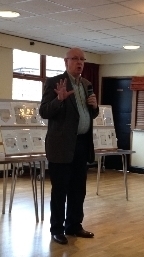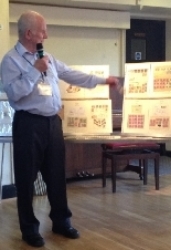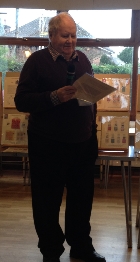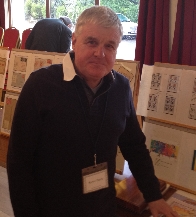They say variety is the spice of life, and January certainly delivered that theme with our member’s displays, which were extremely varied and entertaining. David Bravery kicked off the afternoon with the 'Dual Monarchy of Austria and Hungary' between 1867 and 1918 showing us what befell both countries before and after the war.
Roy Gilbert took us back to the postal strike of 1971, and then we enjoyed a frame of ‘Wild flowers’ presented by Julia Todd learning about the most protected flower (orchid) in the UK. Following on was Derek Weston with ‘Mail from Tangiers.’
Finishing the first half was Michael Lockton with his superb three frames of Exeter postal history, showing us penny blacks, penny reds, some with Maltese crosses and explaining how the postmaster of Exeter did not always follow the rules. We also saw some wonderful Mulreadys along with covers, all with crisp Exeter obliterations.
The second half was just as intriguing as the first. Paul Taylor gave a display of Austrian stamps on cover during the inflation period. Next was David Ellis's display of George V’s Silver Jubilee, which was essentially his late fathers. His father had a great gift for drawing with pen and ink, and David showed some of his commonwealth pages of Silver Jubilee stamps, which were each headed by a pen and ink drawing of the country drawn by his father, which were very impressive, a great talent.
Denis Littlewort then displayed part of his wonderful collection of KGV key plates from Malta, Bermuda, Leeward Islands and Nyasaland. Phil Kenton showed us the conveyance of single letters by railway from 1830-1891. Amazing to think that at one time there were 300 railway companies in that period. Conveyance by train was the fastest way of getting a letter delivered if you took it to the station first thing in the morning, therefore, getting it on the first train of the day. The last day of this service was in 1984 costing 6p for the postage and £1.81 plus 27p VAT for the privilege.
Steve Paice gave us a humorous display of ‘Things I wish I had never got involved in.’ Essentially it was Australian stamps but in blocks initially, then pairs, or gutter pairs, but the Australian postal authorities didn’t understand what he meant by pairs, so they doubled up on everything they sent him including all manner of folders/booklets and stamps, even after he telephoned them to explain what he meant by pairs – he still got future orders in duplicate but not pairs!
Last but not least was Graham Mytton, who as always, was entertaining with his selection of BBC covers. He worked in audience research at the BBC for most of his life. The BBC had up to half million letters sent to them at its height, but sadly its now mostly emails etc. He showed us various covers from around the world, some covered in stamps (inflation) others addressed to the BIBIC LADEN (BBC London) and one just addressed to the Voice of England, which found its way to the BBC.
A most entertaining and enjoyable afternoon.










